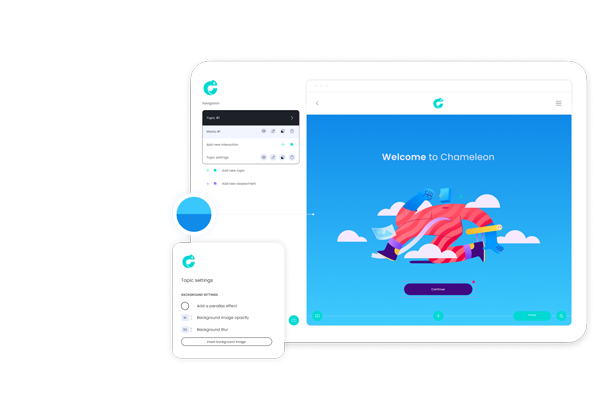Navigating the Authoring tool galaxy
“I don’t know what I’m looking for… I think it might be because if I knew I wouldn’t be able to look for them.” Douglas Adams: The Hitchhiker's Guide to the Galaxy
If you’re a learning professional looking to create an online course, sometimes deciding on which authoring tool to use can feel like navigating in the dark.
The good news is, there is some shining light. Notable authoring tools have advanced and are showing distinct design and technological directions which can help us answer the question: ‘Is it for me?’
The even better news is, we have compiled a handy guide for you. We compare three of the most common authoring tools out there so you can get a better idea on the different aspects of course authoring that you need to weigh up.
DOWNLOAD: Authoring Tool Comparison Guide (Chameleon vs. Storyline & Rise)
First, let’s cover some of the questions that you need to ask before diving into the pros and cons of the tools.

The Purpose of learning
This is the most important of all considerations. Think hard about the objective of your learning before making any other decisions. Sometimes the answer may even be that it doesn’t need to be an online module at all!
If eLearning is the way to go, then think about:
- How complex does the learning need to be in relation to the problem?
- How visually rich do you want it to be?
- What kind of interactions are expected e.g. is it a simulation? Is it an awareness piece?
- Does it require an assessment?
- What level of reporting is required?

Your vision
Authoring a piece of learning isn’t like creating something using a 3D printer where what you have in mind can be recreated precisely as designed.
There will be compromises along the way, especially if you’re the creative type who likes to push boundaries.
You need to be clear about your vision and understand where you can pivot if required.
And don’t forget, your vision should align with the purpose of your learning.

Platform Hosting and distribution
A platform to host and distribute your learning can sometimes be a deciding factor.
- An LMS, for example, will require the learning to be published in certain standards, and every LMS has its quirks so you will need to investigate which authoring tool is best supported by it.
- If it’s for web distribution, you will need to find out the server requirements and what files are supported.
- Mobile vs desktop deployment will need to be taken into consideration too, as authoring tools have strengths and weaknesses when it comes to screen responsiveness.
I’ve been in the learning industry for more than 20 years, and I’m an outside-the-box kind of learning designer. However, when it comes to authoring tools, experience tells me it usually pays to go with the more popular ones, for reasons like level of support, community of users, and regular software updates.
Without further ado, here are my three picks of authoring tools and why. More detailed comparison can be downloaded here.
 |
ChameleonIt’s easy to use; anyone can use it. It offers a wide range of visually attractive interaction templates. Interactions display responsively, so text, images, buttons, etc wrap and/or resize depending on your device. Output is clear and user friendly, whether you’re using a phone, tablet or desktop. |
 |
StorylineIf you’re aiming for the sky, this is the authoring tool to go where you can pretty much create anything. To make the most of this tool, you’ll need someone who’s well-versed in authoring, especially when complex scripting is required. One thing to note, Storyline modules are not responsive. So, on smaller screens like phones, the interface simply shrinks to fit the screen. |
 |
RiseOut of the three, this is the simplest to use. There are plenty of interactions in its library, although visually, you are pretty restricted with what’s offered out of the box. Rise modules display great on small screens because the output is fully responsive. |
Hopefully this article has been useful and encouraging for you. Remember, technology is just an enabler. It’s what’s inside it that matters.
If you haven’t already, download the full comparison between Chameleon, Storyline and Rise here.
About the author
With close to 20 years experience in eLearning, Anglia is a powerhouse when it comes to SCORM/AICC integration and LMS Support including Kallidus, TotalLMS, Moodle, Janison and GrowPotential. When she's not being a technical genius, you'll find her planning, storyboarding, authoring and ensuring standard-compliant learning for our clients.





